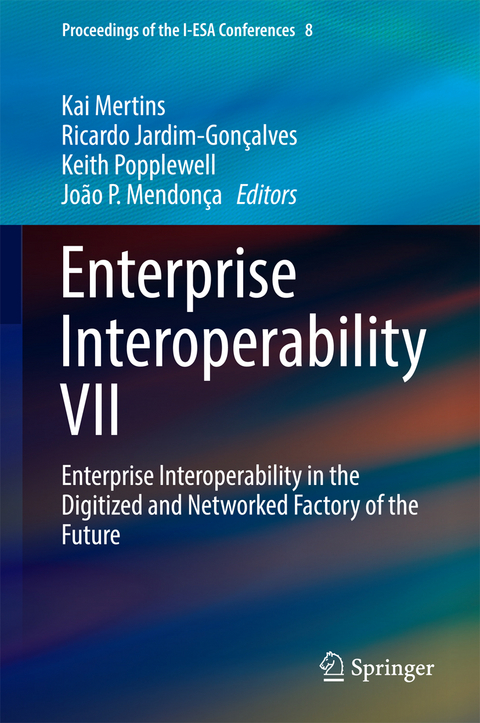
Enterprise Interoperability VII
Springer International Publishing (Verlag)
978-3-319-30956-9 (ISBN)
A concise reference to the state of theart in systems interoperability, EnterpriseInteroperability VII will be of great value to engineers and computerscientists working in manufacturing and other process industries and tosoftware engineers and electronic and manufacturing engineers working in theacademic environment. Furthermore, it shows how knowledge of the meaning withininformation and the use to which it will be put have to be held in commonbetween enterprises for consistent and efficient inter-enterprise networks.
Over 30 papers, ranging from academicresearch through case studies to industrial and administrative experience ofinteroperability show how, in a scenario of globalised markets, where thecapacity to cooperate with other organizations efficiently is essential inorder to remain economically, socially and environmentally cost-effective, themost innovative digitized and networked enterprises ensure that their systems and applications are ableto interoperate across heterogeneous collaborative networks of independent organizations.This goal of interoperability is essential, not only from the perspective ofthe individual enterprise but also in the business structures that are nowemerging, such as complex collaborating networks of suppliers and customers,virtual enterprises, interconnected organisations or extended enterprises, aswell as in mergers and acquisitions. Establishing efficient and relevantcollaborative situations requires the management of interoperability from adynamic point of view: a relevant and efficient collaboration of organizations mayrequire adaptation to remain in line with changing objectives, evolvingresources, unexpected events, etc. Many of the papers contained in this, the eighthvolume of Proceedings of the I-ESAConferences have examples and illustrations calculated to deepenunderstanding and generate new ideas.
The I-ESA'16 Conferencefrom which this book is drawn was organized by the Escola de Engenharia daUniversidade do Minho, on behalf of the European Virtual Laboratory for EnterpriseInteroperability (INTEROP-VLab) and Interop VLab Portuguese Pole.Prof. Dr.-Ing. Kai Mertins was born 1947 in the Federal Republic of Germany. After studies of Control Theory in Hamburg and of Economy together with Production Technology at the Technical University of Berlin he was a member of the scientific staff of the University Institute for Machine Tool and Manufacturing Technology (IWF). Since 1983 he was head of the department "Production Control and Manufacturing Systems" at the Fraunhofer-Institute for Production Systems and Design Technology (IPK), where he is since 1988 Director for Planning Technology. Since 1998 he is Professor for Production Management at the Technical University of Berlin, Germany. He has more than 20 years experience in design, planning, simulation and control of flexible manufacturing systems, manufacturing control systems, shop floor control systems, computer integrated manufacturing, business reengineering and enterprise modelling as well as Intellectual Capital Statement. He was General Project manager in several international industrial projects and gave lectures and seminars at the Technical University Berlin and several other universities.
Part I: Introduction.- An Interoperable Cloud Environment of Manufacturing Control System.- A New Framework for Strategic Risk Analysis in a Global Pump Manufacturing Network.- Cloud and Services Testing Applied in Manufacturing.- A Self Sustainable Approach for IoT Services Provisioning.- Part II: Modelling the Enterprise Interoperability.- Requirement Pattern Elicitation Approach of Massive Customers in Domain Oriented Service Requirement.- Semantic Data Integration Approach for the Vision of a Digital Factory.- Negotiation Coordination Model for Supporting Enterprise Interoperability.- Part III: Semantics for Enterprise Interoperability.- The Systems Development Life Cycle to Facilitate Progression Towards Semantic and Organizational Interoperability for Healthcare System.- Performance Oriented Decision Making to Guide Web Service Lifecycle.- Profiling Based on Music and Physiological State.- Part IV: Architectures and Frameworks for Interoperability.- Automated Process Model Generation for Internet of Things Oriented Enterprise Systems.- Use of Big Data for Continuous Interoperability in Crisis Management.- Weaving Trending, Costing and Recommendations Using Big Data Analytics: An Enterprise Capability Evaluator.- The Industry Cockpit Approach: A Framework for Flexible Real-time Production Monitoring.- Part V: Services for the Enterprise Interoperability.- iFloW: An Integrated Logistics Software System for Inbound Supply Chain Traceability.- Qualitative Evaluation of Manufacturing Software Units Interoperability Using ISO 25000 Quality Mode.- Process Modeling Approach for the Liquid-Sensing Enterprise.- Part VI: Ontologies and Concepts for Enterprise Interoperability.- A MetaMeta Level Formal Manufacturing Ontology for Meta Level Production Methods.- Towards an Interoperable Decision Support Platform for Eco-labeling Process.- Framework of Design Principles and Standards for Enterprise Interoperability Service Utilities.- Part VII: Industrial Implementation of Enterprise Interoperability.- Requirements Engineering Using Serious Games.- Knowledge-based System to Enhance Coordination of Hospital Practitioners: A Case Study.- Towards a Flexible Gamification Model for an Interoperable E-learning BP Simulation Platform.- Part VIII: Collaborative Supply Networks Interoperability.- Towards a Methodology to Support the Strategies Alignment Process in Collaborative Networks.- Meta-modeling of Collaborative Supply Chain.- Seamless Interrelation Between Business Strategies and Tactical Planning.- A Competition Model for the Offer: An Experiment of Management Simulation.
| Erscheinungsdatum | 08.07.2016 |
|---|---|
| Reihe/Serie | Proceedings of the I-ESA Conferences |
| Zusatzinfo | XIV, 344 p. 104 illus., 87 illus. in color. |
| Verlagsort | Cham |
| Sprache | englisch |
| Maße | 155 x 235 mm |
| Themenwelt | Technik |
| Schlagworte | Communications Engineering, Networks • conference proceedings • Engineering • Engineering Economics • Engineering Economics, Organization, Logistics, Ma • enterprise applications • Enterprise Interoperability • enterprise modelling • Enterprise Semantics • management of computing and information systems • Software engineering • Software Engineering / Softwareentwicklung • Systems Compatibility |
| ISBN-10 | 3-319-30956-0 / 3319309560 |
| ISBN-13 | 978-3-319-30956-9 / 9783319309569 |
| Zustand | Neuware |
| Haben Sie eine Frage zum Produkt? |
aus dem Bereich


